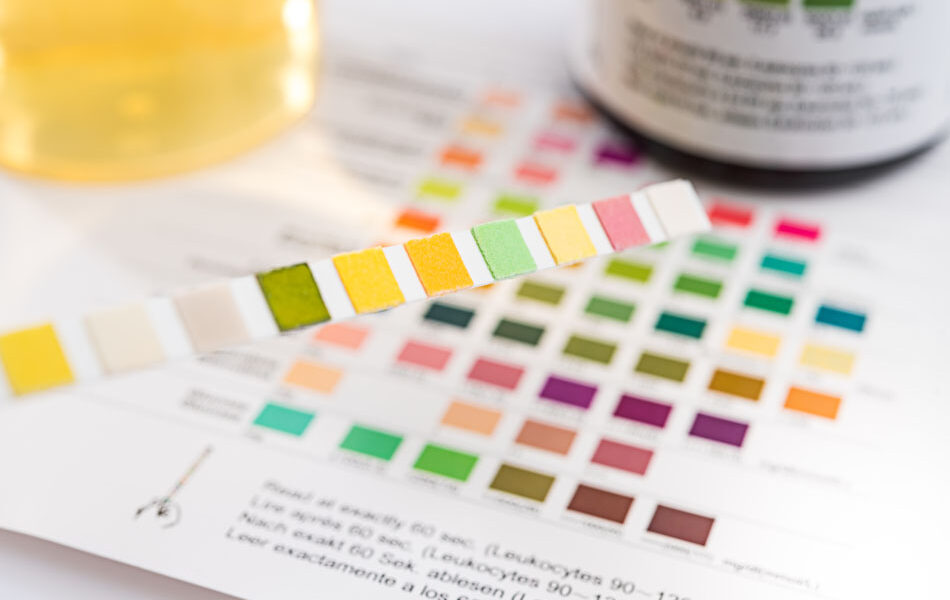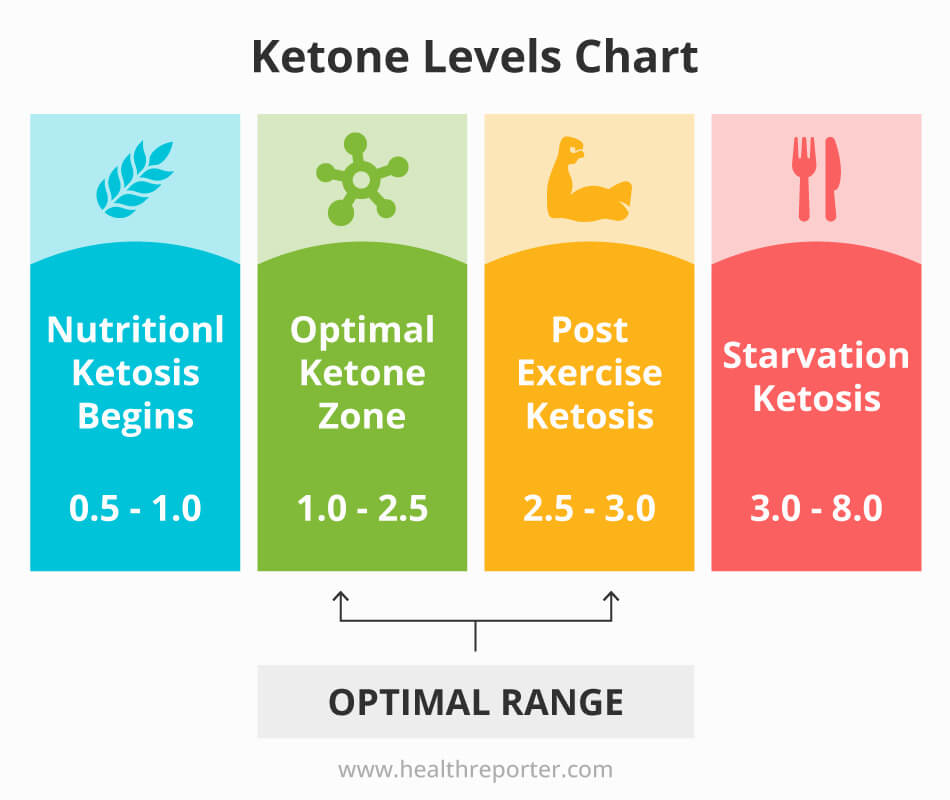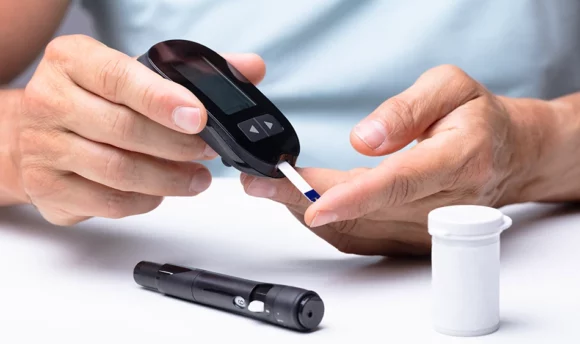Ketone Levels Chart: A Guide to Measuring Ketones
Measuring your ketones is important for determining ketosis. You can also understand more about how these chemicals work in the body during weight loss. We explain how to measure ketones, including what your levels should be when trying to lose weight.

People who follow the ketogenic diet should measure their ketones.
It’s important to understand your ketone levels when losing weight. These chemicals are key to encouraging ketosis in the body. Without the right amount of ketones, you won’t be burning enough stored fat.
There are several ways you can measure ketones by looking at the level chart. You could see how your results fit within the recommended range, so it’s worth learning more about how the special chemicals work during the keto diet.
In this article, you’ll discover more about measuring ketones.
Thank you for your answer
Health Reporter Surveys
Ketone Levels Chart: Understanding Ketones
A ketone levels chart is what measures your ketones and determines if they’re high enough for weight loss. You can read this chart to compare your results against the recommendations. Some people use a urine ketone testing kit to get accurate results.
Being on the keto diet, you have to understand how ketosis works. Low ketone levels mean your body won’t be able to burn stubborn weight. By looking at a designated chart, you’ll learn more about optimal ketone zones and dangerous levels at which you could face health risks.

For example, a reading of 8–10mmol/L represents ketoacidosis. This is a condition where your body produces too many blood acids. It’s important to be aware of these ketone readings, as you want to stay in the recommended range of 0.5–3mmol/L when achieving weight loss.
What Are Ketones?
Ketones are chemicals your liver produces when it breaks down stored fats. The ketone bodies usually become blood ketones by circulating your body and fueling important organs. You’ll experience high ketone production when following a low-carb diet.
The main source of energy in your body is glucose, and so when you don’t have enough of that, the liver makes extra ketones to keep you functioning properly. People with diabetes tend to test their blood ketone levels to ensure their health condition isn’t getting out of control.
You’re essentially producing ketones all the time, but this changes according to your protein and carb intake. Keto dieters may reach optimal ketone levels when restricting carbohydrates. This is because eating lots of carbs encourages the body to burn glucose instead of fat.
How to measure ketones?
There are three easy ways you can measure ketone levels. These comprise urine ketone strips, blood testing, and breath tests. All of these readings are accurate when done at home, but it’s worth seeking help from a professional if you have type 2 diabetes.
The first test, the most popular one, requires you to urinate in a cup and place the strip into the urine. After a few seconds, the urine strips should change color. Depending on what bottle you bought, there should be a table on the packaging that determines your levels.
A blood test is more common for those with certain health conditions. You simply grab the test strips, prick your finger, and place the blood onto the absorption pad on the strip. The results might take longer, but you’ll soon find out if your ketones are in the optimal range.
Lastly, there are breath acetone tests you can buy online. Breath tests measure the ketone levels in your body once you exhale. By measuring acetone concentrations, you can determine whether the blood is too acidic or just right while following the ketogenic diet.
What Should Your Ketone Levels Be?
Normal ketone concentrations are 0.5mmol/L or less. This means you’re not following any kind of diet to raise ketone levels. However, for light nutritional ketosis, you may have a reading of 0.5–1.0mmol/L, which signals the fat-burning stage.
Everyone will have different levels of ketones throughout the day. It all depends on what meals you eat and how much you exercise. People who are trying to lose weight usually have lower blood glucose levels, which encourages the body to produce ketones at a faster pace.
Those who are trying intermittent fasting regimens may also have a higher “fasting” ketone level. This reading might be 0.5–3mmol/L, depending on how long they refrain from eating calories. It’s always better to regularly check your levels to make sure they’re safe.
What Level of Ketones Indicates Ketosis?
Nutritional ketosis is defined by showing 0.5–3mmol/L on blood ketone meters or urine strips. This is the desired ketone level when it comes to fat loss on the keto diet. Anything above this amount could suggest fasting or early signs of ketoacidosis.
Finding the right balance in your blood glucose content and ketone levels can help push you into ketosis quickly. It’s important to limit your carb intake and measure frequently when wanting to lose body fat, as nutritional ketosis won’t happen without cutting out certain foods.
A reading of 0.5–3mmol/L means your body can already burn fat throughout the day. The liver is producing enough ketones to eliminate glycogen stores completely. You don’t need to restrict the keto diet even more or increase excess ketone bodies for weight loss benefits.
What Level of Ketones in Urine Indicates Ketosis?
Anything above 0.5mmol/L on the urine strips means you’re in ketosis. Just be aware that dehydration affects urine ketones, so always stay hydrated when testing. If you see results exceeding 3mmol/L, stop following the diet to get your ketone levels down.
Taking your urine levels in the early morning or post-dinner time shows the most accurate results for nutritional ketosis. During this time, you should drink lots of water to reach the optimal ketone level. Otherwise, there won’t be many ketones in your urine to test properly.
For people who want consistent results, consider taking a blood test instead. A blood ketone meter stops excess urine strips from going to waste. Even though urine testing is common at home, those with diabetes may need better results for blood sugar levels and nutritional ketosis.
Ketones and Keto Diet: Why Are Ketones Important?
To lose weight on the keto diet, you have to boost ketone levels in your body. These ketones are important for encouraging the fat-burning state. Ketones are there to fuel every aspect of the body, from repairing cells to fueling organs during weight loss.
Low-carb diets basically deprive your body of blood glucose. When this happens, ketone bodies replace glycogen stores as the main source of energy. Entering the metabolic switch means you’ll start burning fat to function properly, including visceral fat hidden in your stomach.
This is why people want to achieve ketosis while following the diet. So, if you don’t have enough ketones during nutritional ketosis, the body cannot sustain normal life functions. Ketone levels need to be in the optimal range when giving you plenty of energy and burning fat.
Some common signs of nutritional ketosis include headaches, fatigue, muscle cramps, bad breath, and increased thirst. While these symptoms might sound intimidating, they’re perfectly normal. The body needs time to adjust to there being more ketones in your bloodstream.
What Is the Ideal Ketosis Level for Weight Loss?
Your ketone reading should be 1.5–3mmol/L when losing weight. Sitting in this range ensures you’re burning fat at a sustainable pace. People who notice higher results on their blood ketone meter should seek medical help or stop following the keto diet.
To achieve these results, you have to significantly restrict how many carbs you eat. Going over 30–50 grams of carbs a day may stop ketosis from even happening. The body will instantly burn carbs for fuel, so always monitor how much you’re eating to stay above 1.5mmol/L.
A blood glucose meter could also help you reach this range. Too much glucose suggests you’re not following the keto diet correctly. It might also help people with high blood sugar levels, as they can determine whether the blood ketone content is suitable for managing diabetes.
A Word From MD
Measuring your ketone level is very important for maintaining optimal health. Simple tests will show how the body responds to a low-carb intake. For example, starvation ketosis happens during fasting, but that doesn’t mean it’s good if the levels are above 3.0mmol/L.
By looking at our chart, you’ll know exactly where your results sit. Starting your keto journey requires lots of experimentation and awareness. Ketoacidosis occurs when people don’t check their levels regularly or go too far when cutting out important minerals in their diet.
Before starting keto, consult with a medical professional. Doctors will know whether a low-carb meal plan is right for your personal health. You don’t want to experience high ketone concentrations when dealing with inconsistent glucose, sugar, and insulin levels as well.
Conclusion
Looking at the ketone levels chart ensures you understand the optimal and dangerous range. This is very important for looking after your long-term health. If you need more assistance with ketone measurements, consider consulting with your doctor before trying this diet.

















































 Select your language:
Select your language: 








